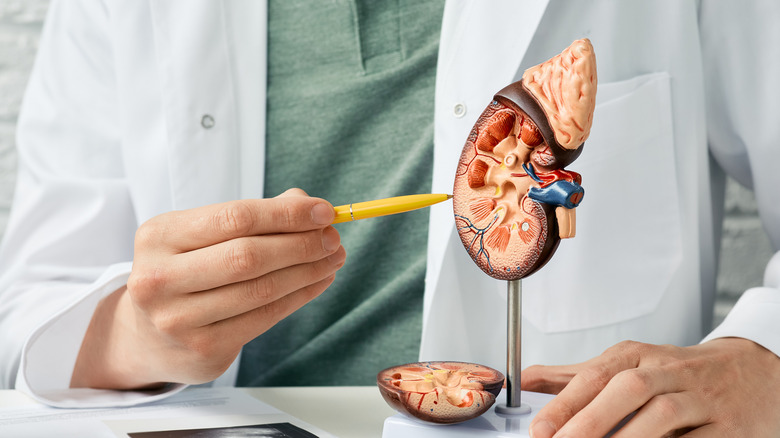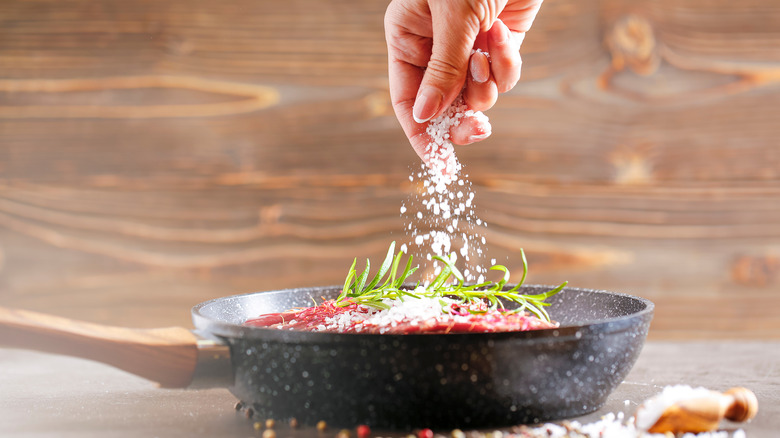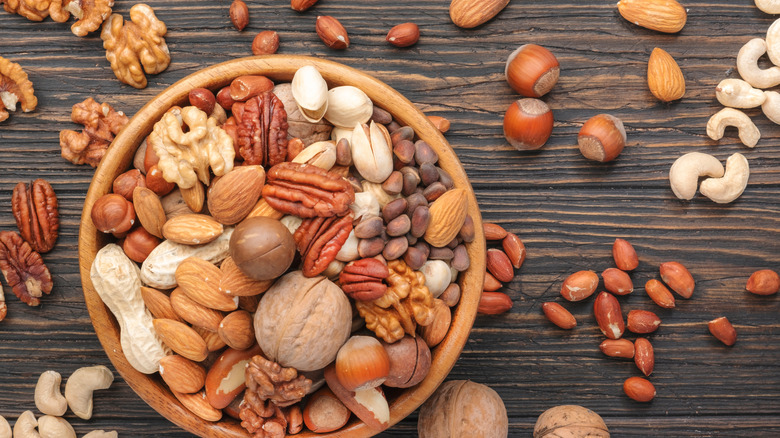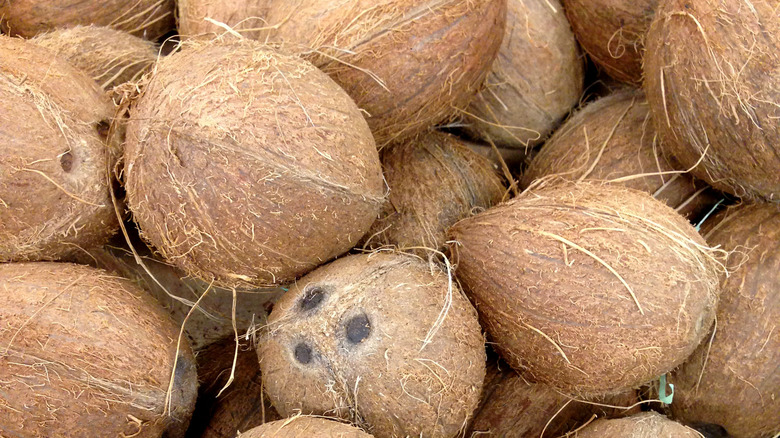Everything You Wanted To Know About Electrolytes
When you're out on a hot day playing sports, running, or doing work around the house, dehydration can be a problem. Sometimes, you sweat more then you realize, and a sharp feeling of thirst suddenly hits you. You might have heard that the best way to rehydrate is with electrolytes, which are in many sports drinks. However, you might not know exactly what electrolytes are, or why your body needs them.
Electrolytes are important for much more than rehydration. According to MedlinePlus, electrolytes have an electric charge, and are used in much of the fluid and tissue in your body. Your brain, muscles, and heart all need electrolytes to work properly. Electrolytes are minerals you've probably heard of before, such as sodium, potassium, and calcium. If you have an imbalance of electrolytes in your body, you can feel sick or have even more serious symptoms. Most people get enough through their diet, but sometimes, supplements like sports drinks can help maintain the amount of electrolytes in your body.
Here's everything you need to know about electrolytes.
Electrolytes have an electrical charge
Electrolytes are a very appropriately named group of minerals found in the body. They carry either a positive or negative charge when in water. The charge they carry depends on the electrolyte. The Cleveland Clinic explains that if you take salt and dissolve it in water, it breaks apart. There are two basic elements to salt: sodium and chloride. They split up when dissolved in water, and when they split, sodium becomes positively charge and chloride becomes negative.
You have charged electrolytes floating around your body, which help create electrical currents. The neurons in your body, which allow your brain, heart, and muscles to function properly, use these electrical currents constantly. According to a paper published by StatPearls, sodium and potassium are the main electrolytes involved in nerve cells. To create an electrical current, also known as an action potential, sodium is pushed out of a cell and potassium is pushed in. This electrical current travels down a nerve to deliver its message.
Electrolytes regulate fluid
When you drink water, it goes down your throat and into your stomach. After that, your body has to distribute it to areas in need. Over half the body is made of water, according to Merck Manual. That fluid doesn't simply slosh around, though; it gets distributed and placed into areas known as fluid compartments. Basically, it goes in or around cells and into your blood.
Electrolytes helps regulate the water in your body, making sure it gets evenly dispersed. They float around in your blood and other liquids in your body. Sodium is one of the most important for fluid regulation, and helps with a process called osmosis. Water is dispersed depending on the concentrations of electrolytes such as sodium.
If more water enters a cell, the amount of sodium gets diluted. This tells the body that more fluid has entered, and it might try to get some of it out to get back to the original concentration of sodium in the cell. If there's more water in a cell and less electrolytes, it has a low concentration. That's why electrolyte balance in the body is so important.
Kidneys help regulate electrolyte levels
Electrolytes play an important role in your body, both by sending electrical signals and regulating fluid. It's important that you maintain a balance of electrolytes, because if they can't do their job, your body could be in trouble.
One of the many jobs of the kidneys is to regulate electrolyte balance in the body, says Merck Manual. The kidneys take blood and filter out electrolytes or water, depending on the concentration of each. If there's a high concentration of electrolytes, the kidneys can take some out of your blood and pass it out of your body through your urine. If the electrolyte concentration is low, the kidneys will take water out of the blood and pass it out through your urine.
If your kidneys have problems and don't work well, it can disrupt the electrolyte balance in your body. According to the University of California Los Angeles Health, kidney failure can lead to dangerously high levels of potassium and phosphate, as well as low levels of sodium and calcium.
Electrolytes help you rehydrate
Fitness enthusiasts and athletes alike have been targeted by sports drink companies that claim their products are better than water at hydrating after a workout. When you exercise, or if you're simply outside in the heat and sweating, moisture is evaporating from your body to cool you down. Over time, dehydration can set it.
To prevent dehydration, you might not actually need those fancy sports drinks. According to the National Council on Aging, water should be able to rehydrate your body after a short workout. However, exercising in the heat or for over an hour can deplete electrolyte levels as well as fluid, and some type of supplement might help. In these situations, sports drinks might not be the best option, because some of them contain sugar, hydrogenated oils, or high-fructose corn syrup, which might not be good for your health. Instead, you can opt for sugar-free or low-sugar electrolyte supplements, or water enhanced with electrolytes.
Ingesting too many electrolytes without enough water can also be a bad thing. For example, eating salty potato chips without drinking enough water can actually dehydrate your body, because you're consuming too much sodium.
Electrolytes impact workout performance
While not every workout or sweaty day in the sun requires electrolytes to rehydrate, some instances call for an added boost to help with recovery. A study published in the Journal of Sports Science found that adding sodium to water could help athletes rehydrate and recover faster. The researchers note that you could replenish electrolyte levels through your normal diet, but athletes or workout enthusiasts who are looking for a faster recovery might want to supplement with sodium.
The study findings also reveal that losing too much water and sodium through sweat could actually make people perform worse. It puts a strain on your heart when you're dehydrated, and makes it harder to regulate body temperature. The scientists saw a decrease specifically in aerobic performance when athletes were dehydrated.
If you need to do your sport or workout again within 24 hours, water and electrolytes can be helpful. Be careful when selecting drinks to rehydrate, though, as the United States Anti-Doping Agency warns that many sports drinks actually have low sodium levels (roughly the same amount as low fat milk).
Sodium
There's more sodium in your body than any other electrolyte, according to the Cleveland Clinic. Too much sodium can lead to a condition called hypernatremia, which can cause changes in your behavior and heightened reflexes, as well as more serious problems such as seizure. Too little sodium, known as hyponatremia, can also cause seizures and feelings of illness like vomiting and nausea.
You don't need too much sodium through your diet to stay healthy, though. Probably only around 500 milligrams per day is necessary, per the Harvard T.H. Chan School of Public Health. There's about 3,400 milligrams of sodium in a teaspoon and a half of table salt, so most people are able to reach their daily sodium goals easily. Processed foods are more likely to have sodium than unprocessed food like fruits and vegetables. In fact, much of the sodium in modern diets comes from adding salt to food or eating things like bread and cured meats that contain salt.
Too much sodium in your diet can be problematic, since it puts extra strain on your kidneys and can raise blood pressure. When you have too much sodium in your blood, your body will store more water in an attempt to dilute sodium levels, which can negatively affect the heart.
Potassium
Potassium goes hand in hand with sodium. They work together to create action potentials, and your body needs potassium for proper heart function, according to the Cleveland Clinic. It's important that you get enough of this electrolyte, because if you don't, your heart rhythm can be thrown off.
The Office of Dietary Supplements lists the recommended amount of potassium per day for people of all ages. For male adults, above age 19, they recommend 3,400 milligrams per day. For females of the same age, that number drops to 2,600. Unlike sodium, many fruits and vegetables contain potassium. You can also get it through beans and dairy products like milk and yogurt.
Many people in the United States don't get enough potassium through their daily diet. If that's your situation, you can simply eat more foods that contain potassium or take a supplement. If you don't have enough potassium, you can have high blood pressure, and your bones can become weaker over time. That said, there are certain medications that can interact with potassium, so tell your doctor before you start taking a potassium supplement.
Calcium
Many people know of calcium through the popular "Got Milk" ad campaigns that promoted milk for the creation of strong bones. The thought was that the calcium in milk could help people strengthen their bones. However, calcium does much more than this in the body. For example, a paper published by StatPearls explains that calcium helps your muscles fire, helps nerve send electrical signals, prevents excessive bleeding, and helps your body produce hormones.
You can ingest more calcium through food and drinks, but it might not boost calcium levels in your body. That's because you need vitamin D to help absorb the calcium that passes through your intestines. MedlinePlus explains that dairy is the best source of calcium. Milk, yogurt, and cheese all contain large amounts of the electrolyte. However, if you don't like dairy or can't consume it, there are other options.
For starters, green, leafy vegetables such as kale contain calcium. Some nuts, such as almonds and macadamia nuts, also contain calcium. Fish such as salmon and sardines can help as well. There are also calcium supplements available, which might help if you don't get enough through your diet.
Magnesium
Perhaps not as well-known for its role as an electrolyte, magnesium is actually the fourth-most prevalent electrolyte in the body, according to a study published in Medical Sciences. It plays some very important roles in the body. For instance, magnesium helps DNA and RNA form properly. It also helps sodium and potassium create action potentials. It also helps other electrolytes create electric currents that regulate things like the beating of the heart.
Magnesium can be found in a variety of foods. Nuts and green, leafy vegetables both contain the electrolyte, according to the Harvard T.H. Chan School of Public Health. It's also present in rice, oats, some fish, and even dark chocolate. If you need more magnesium than what you get in your diet, you can take supplements as well. Interestingly, there are also certain laxative medications that contain magnesium.
If you don't have enough magnesium, you might feel tired or sick. You can also experience muscle cramps and seizures. Diabetics, alcoholics, and older people are the most likely to be deficient in magnesium.
What to drink for electrolytes
Various drinks have been promoted for rehydration and replenishment of electrolytes. For this reason, it can be hard to sift through the marketing and advertisements to figure out what the best products are, or if there are alternatives.
Georgia State University lists popular drinks that contain electrolytes, as well as some you might not have considered. Of all the drinks on their list, coconut water is perhaps the most loaded with electrolytes. It contains 252 milligrams of sodium and a whopping 600 milligrams of potassium in just 8 ounces. People living in hot climates with access to coconuts could benefit greatly from this nutritious drink. One can also find it in many stores.
Pedialyte, a drink marketed as being safe for children, has 243 milligrams of sodium and 183 milligrams of potassium in 8 ounces. Milk has less sodium, with 107 milligrams in 8 ounces, but it boasts 366 milligrams of potassium. That means someone who needs more potassium but less sodium should consider coconut water or milk as an alternative to sports drinks.
Surprisingly, Gatorade and Powerade have fewer electrolytes than the beverages above. Gatorade has 106 milligrams of sodium and only 30 milligrams of potassium. Meanwhile, Powerade has 68 grams of sodium and 80 grams of potassium.
What to eat for electrolytes
Replenishing your supply of electrolytes is also possible, and maybe even easier, through food.
For sodium, Georgia State University recommends eating something salty, like pretzels or peanut butter. Sometimes, after a long workout with lots of sweating, you might crave salty foods. That could be your body's way of telling you to eat sodium. According to a chapter from Diet and Health, ancient paleolithic humans ate diets that were high in potassium, but low in sodium. Throughout human history, salt was a prized possession and hard to come by. The authors explain that the body adapted by retaining salt and developing taste buds that were sensitive to sodium, which make salty foods taste good.
To replenish the chloride that's lost through sweat, Georgia State University recommends rye bread and vegetables like tomato and celery. For more potassium, try to eat either white or sweet potatoes. You can also try to get potassium through vegetables like kale and spinach. For calcium, stick to dairy products like milk and yogurt. Cereal is another option if you're lactose intolerant.
Causes of electrolyte imbalance
The amount of electrolytes in your body has to be tightly controlled at all times, since they're involved in so many critical roles.
According to the MD Anderson Cancer Center, there are a number of things that can throw the amount of electrolytes in your body out of whack. Common causes for too few electrolytes include sickness. If you're vomiting or have diarrhea, you're losing fluids and electrolytes with it as well. Likewise, sweating also causes fluid and electrolyte loss.
People undergoing chemotherapy are at an increased risk for electrolyte imbalance. There are also some prescription drugs, such as Lasix, that make the body hold onto water and can cause a buildup of electrolytes. Some antibiotic medications and immunosuppressants can cause an imbalance in your electrolyte levels. Another common culprit is poor diet; you can either lack some electrolytes or consume too many. If your electrolyte levels get too low, your doctor might suggest using an IV to get them into your blood quickly.
You can test your electrolyte levels
If you think your electrolyte levels are too high or too low, or if you have symptoms of either problem, your doctor can order tests to see for certain. The UK National Health Service explains that you can have such tests done as part of a routine physical as well, to check to make sure everything is in balance. Sometimes, your doctor will ask for an electrolyte test if you start a new medication, since some of them can alter your levels.
Blood tests can be used to check the pH levels in your blood. Electrolytes can actually change your blood pH levels. Depending on the imbalance your doctor finds, they might recommend cutting back on or adding more of certain electrolytes.
Another way doctors can check electrolyte levels is through a sweat test. They'll put a chemical on a small part of your skin and an electrode on top to make your skin sweat, according to Mount Sinai. Then, they can collect the sweat and analyze it. This type of test is also used to diagnose cystic fibrosis.
Symptoms of electrolyte imbalance
To figure out if you have too much or too little of certain electrolytes, you should know the symptoms that come along with each. Piedmont Hospital warns that symptoms such as dizziness, abnormal heart rhythms, and a feeling of mental fog are all signs that you have imbalanced electrolytes. Muscle cramps are another possible sign of problems with electrolytes, which can be painful and problematic for athletes.
Electrolyte levels are important, and doctors often monitor them when patients enter an emergency setting. According to a study published in PLOS One, electrolyte imbalances were related with longer hospital stays in people who had to go to the emergency room. The researchers also found that low levels of certain electrolytes, such as calcium, were found in many patients who had to come back to the hospital. The researchers weren't sure if the electrolyte imbalances were caused by medical problems or if they were causing them, but either way, they encourage testing of electrolyte levels when patients get to the hospital.















